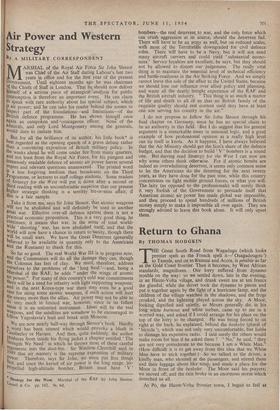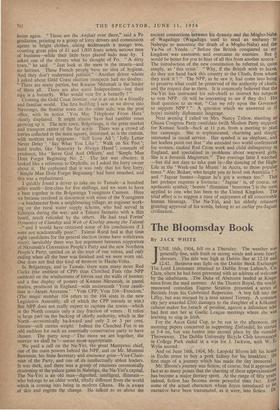Return to Ghana
By THOMAS HODGKIN THE Great South Road from Wagadugu (which looks prettier spelt as the French spell it—' Ouagadougou ') to Tamale, and on to Kumasi and Accra, is penible as far as the Gold Coast frontier. Then it becomes, by West African standards, magnificent. Our lorry suffered from dynamo trouble on the way: so we settled down, late in the evening, in an Haute-Volta village, and drank sweet tea at ten francs the glassful, while the driver took the dynamo to pieces and put it together again by the light of a hurricane lamp, and the children of the village watched in the shadows, and the frogs croaked, and the lightning played across the sky. A Moor, looking dignified and saintly, as Moors generally do, in his long white burnous and white turban, came up to me in a worried way, and asked if I could arrange for his place on the top of the lorry to be changed. He was being forced to sit right at the back, he explained, behind the beskelet (plural of 'bicycle '), which was not only very uncomfortable, but liable to damage his expensive radio. I said surely the others would make room for him if he asked them ? "No," he said, "they are not very considerate to me because I am a White Man.' (How difficult it is to get away from this idea that we White Men have to stick together.) So we talked to the driver, a 'kindly man, who shouted at the passengers, and stirred them and their luggage about like soup, and made a place for the Moor in front of the beskelet. The Moor said his prayers; we moved off; and the rain broke in an enormous storm which drenched us all.
At Po, the Haute-Volta frontier town, I began to feel at home again. "Those are the A nglais over there," said a Po gendarme, pointing to a group of lorry drivers and commission agents in bright clothes, sitting Onderneath a mango tree, counting great piles of El and 1,000 franc notes, serious men of business—while their little boys played ludo near by. I asked one of the drivers what he thought of Po. "A dirty town," he said. "Just look at the mess in the streets—and no latrines. These French people have no idea of hygiene. And they don't understand politics." Another driver whom I asked about Gold Coast election• prospects had no doubts: "There are many parties, but Kwame Nkrumah is the leader of them all. There are also some Independents—but their sign is a butterfly. Who would vote for a butterfly ? " Crossing the Gold Coast frontier, one is at once in a friendly and familiar world. The first building I saw as we drove into Navrongo, the frontier town on the other side, was the post office, with its notice You May Telephone From Here' clearly displayed. It might almost have had rambler roses growing up it. The next town, Bolgatanga, is the great market and transport centre of the far north. There was a crowd of lorries collected in the main square, decorated, as is the custom, with mottoes and epigrams: Still Love All '; Jolly Letter Never Delay '; Say What You Like '; Walk on Six Feet '; hard truths, like Seniority Is Always Hated '; counsels of prudence, like 'Serve God And Officers,' and 'Simple Man Dont Forget Beginning No. 2.' •The last was obscure; it looked like a reference to Orphism, so I asked the lorry owner about it. He explained that it was only that his first lorry, Simple Man Dont Forget Beginning' had been smashed, and this was a replacement. I quickly found a driver to take me to Tamale—a hundred miles south—first-class for five shillings, and we went to have a beer together in the Bolgatanga Youngsters Canteen. Here we became involved in discussion with some of the Youngsters —a headmaster from a neighbouring village; an engineer work- ing on the rural water supply scheme, who had served in Ethiopia during the war; and a Talensi fantastic with a thin beard, much ridiculed by the others. He had read Fortes' Dynamics of Clans/zip and Web of Kinship among the Talensi —"and I would have criticised some of his conclusions if I were not academically poor." Talensi Rural had at that time eight candidates for the general election (some have withdrawn since); inevitably there was hot argument between supporters of Nkrumah's Convention People's Party and the new Northern People's Party, carried on at the tops of our voices, and only ending when all the beer was finished and we were worn out. One does not find this kind of ferment in Haute-Volta.
In Bolgatanga, and in Tamale, there were many more Red Cocks (the emblem of CPP) than Clenched Fists (the NPP emblem) on the windscreens of lorries and the walls of houses; and a fine display of posters of Kwame Nkrumah, in pastel shades, produced in England—with underneath Your candi- date is—Jaram Anyeame." Vote CPP; 'Vote 104—Freedom.' (The magic number 104 refers to the 104 seats in. the new Legislative Assembly, all of which the CPP intends to win.) But NPP does not really expect to capture the towns—which in the North contain only a tiny fraction of voters. It relies in large part on the backing of chiefly authority, which in the North—economically backward and only 2 or 3 per cent. literate—still carries weight. Indeed the Clenched Fist is an odd emblem for such an essentially conservative party to have• chosen. The party song—' The more we are together, the merrier we shall be '—seems more appropriate: We paid a call on the Na-Yin, the great Mamprusi chief, one of the main powers behind the NPP, and on Mr. Mumuni Bawumia, his State Secretary and eminence grise—Vice-Chair- man of the Party, and one of its intellectually ablest leaders. It was dark, and there was a group of retainers ceremonially drumming at the palace gates in Nalerigu, the Na-Yin's capital, The Na-Yin i is an old man—dignified, intelligent, illiterate— who belongs to an older world, totally different from the world which is coming into being in modern Ghana. He is aware of this and regrets the change. He talked to us about the ancient connections between his dynasty and the Mogho-Naba; of Wagadugu (Wagadugu used to send an embassy to' Nalerigu to announce the death of a Mogho-Naba) and die Ya-Na of Yende. " Before the British conquered us mY, kingdom was extensive, and overcame its enemies. But would be better for you to hear of all this from another source' The introduction of the new constitution he referred to, quite simply, as this crisis.' "Why, if the British wish to leave, do they not hand back this country to the Chiefs, from whonl they took it?" The NPP, as he saw it, had come into being. to preserve what could be preserved of the authority of chiefs,' and the respect due to them. It is commonly believed that thO Na-Yin i has instructed his sub-chief i to instruct his subjectS to vote NPP. (It will be interesting to see if they do.) His final question to us• was, "Can we rely upon the Governor to support NPP ? " A question which we answered in (I hope) suitably diplomatic language.
Next omening I called on Mrs. Nancy Tsiboe, standing aS Ghana Congress Party candidate (with Moslem Party supportE for Kumasi South—back at 11 p.m. from a meeting to ph n' her campaign. She is sophisticated, charming and deeply interested in social service. Her symbol is an elephant, arli her leaflets point out that "she attended two world conferenceS. for women, studied Red Cross work and child delinquency ill England, and specialised in problems about wayward girls. She is a Juvenile Magistrate." Two evenings later I watch( —but did not dare to take part in-,--the dancing of the Higl Life at the Week-end In Miami' in Accra, to those popular^ tunes "Alec Bedser, who taught you to bowl out Australia ? and "Jaguar beento—Jaguar he's got a woman too." Thig last perhaps requires a footnote: 'Jaguar' is, of course, all apolaustic symbol; beento (feminine beentress ') is the teraf applied to one who has been to the United Kingdom. The total effect is to suggest a state of enjoyment of all conceivable human blessings. The Na-Yin, and his elderly retainers grunting approval of his words, belong to an earlier pre-Jaguat civilisation.



































 Previous page
Previous page